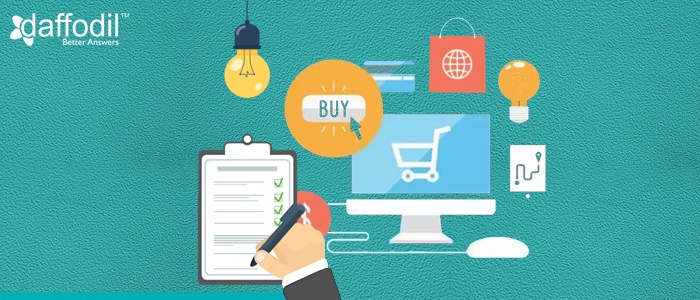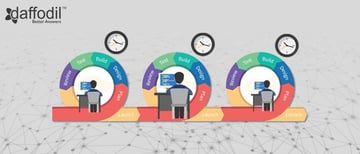
Online shopping is a thriving market. In 2021, over 2.14 billion people worldwide are expected to buy goods and services online, up from 1.66 billion global digital buyers in 2016. As a result, the retailers are realizing the business benefits of selling their products and services online.
However, getting started with an online outlet requires a lot of technical preparations beforehand. In fact, missing out on any technical aspect of building an eCommerce portal may hurt your business immediately, or few months later, when the consequences can be least afforded.
Here, in the later segment, we share 5 significant (technical) factors that will help your offline business have a successful online presence, keeping the cost, scale, and security into consideration.
1. Building a Store Front: A Software Application
To start selling, there has to be a store to showcase the goods and services. This store online is available in the form of a web application. There are two ways to build the online store for selling:
- Content Management System (CMS): Building a an online store using CMS like Magento, OpenCart, Prestashop, Drupal etc. can help to get started with a low to large scale solution. The CMS dashboard offers the ease to add, edit, delete, or manage the content, which is an advantage to the newbie.
- Software-as-as-Service (SAAS): Online platforms like Shopify, BigCommerce, Woocommerce comes under the SAAS model of online store building. While they are low in scope, they offer the benefits like self-customization abilities, SEO and marketing tools, integrated payment gateway etc.
For decision making, you can compare custom app development benefits vs. off-the-shelf product. This can help to conclude between SAAS model or a custom CMS for eCommerce application development.
2. Ensure Data Safety: Have a Security Plan
eCommerce portals store and exchange a lot of sensitive data, ranging from credit card info to delivery addresses, user preferences, contact details etc. Therefore, it is important to take necessary steps to secure all this data. Some of the technical aspects that should be taken into consideration includes:
- A SSL certificate that ascertains that all data exchanged between the user and the server is secured from the prying eyes
- Any credit card information or security codes on website should never be stored in plain text format
- The server should be protected either with host-provided maintenance services or with firewall
Also, regular checkup of the website health must be done to spot and fix bugs/threats that can compromise with user data security on an eCommerce platform.
3. Data Safeguarding against Loss: Preparing Backup
No matter how great a hostings service is, how much uptime does it promise; accidents are likely to happen. Thus, preparing to handle them is definitely a smart move to keep the business going. One of the best solutions is to setup routine, automatic backup of the server so that in case of any fault, the backed-up data gets live in production, without affecting the user-experience.
4. Making it Easy to Pay: Integrating Payment Gateway
Selling and buting cannot happen without a reliable mode of payment. While all technical and functional aspects of the online portal works well, they add no value to the buying cycle, unless a convenient payment mode is integrated to the software. There are a number of payment gateways available that can be chosen according to the platform type, region, or currency. When integrating payment gateways, make sure that you look out for a secure, cost-efficient, a flexible payment gateway for receiving product/service cost from the users.
5. Keeping an Account of Product Delivery: A Shipping Software
Once a user place an order in the online store, it is important to offer a hassle-free experience to them. This is possible by shipping their items on time, enabling them to track the shipment, and updating them about different stages of product delivery (packed, shipped, out for delivery etc.). To ensure that this process is executed seamlessly, a shipping software is what needs to be integrated with the eCommerce application.
Setup your Plans to go Online: We can Help!
Setting up a business online is tricky. Having able to consult the domain experts can go a long way in ensuring that all functional and technical aspects are considered during the launch.
Want to know more about launching a store online? Talk to our digital commerce experts through 30 minutes free consultation service, who will guide you through the process of offline-online store migration.



